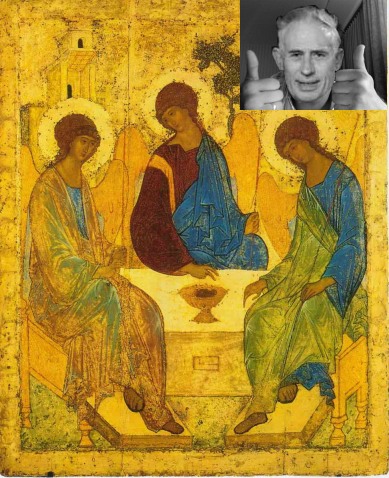podcast 302 – The Stages of Trinitarian Commitment
I have gone through all six. Which stage are you at, and what is keeping you from moving to the next?
I have gone through all six. Which stage are you at, and what is keeping you from moving to the next?
Wheeeeee! Everything is “Trinitarian” now.
Tomorrow (Saturday, March 29) at 12:00 EST I’m debating Roman Catholic apologist William Albrecht on whether or not the important early Christian philosopher-theologian Tertullian (d. c. 225) was a trinitarian. Mr. Albrecht is on the affirmative side; I’m on the negative side. He should be well aware of what I’ll argue. I think Tertullian’s language is confusing (to us), and his theology is strange, but… Read More »my online debate: Was Tertullian a trinitarian?
Earlier catholic theologians like Tertullian and Origen show us how.
 Against Celsus is not the only important surviving book by Origen. Origen’s On First Principles is often called the first systematic Christian theology. It was written some time before 231. It is a bold and wide-ranging work, and in Origen’s day Christian theologians could speculate a fair amount.
Against Celsus is not the only important surviving book by Origen. Origen’s On First Principles is often called the first systematic Christian theology. It was written some time before 231. It is a bold and wide-ranging work, and in Origen’s day Christian theologians could speculate a fair amount.
But the curtain was brought down on this era of freedom by ecclesial-political events of the fourth century. While many still considered Origen a great scholar, the atmosphere was such that one might lose one’s church career if people thought you were too sympathetic to his views.
Among his admirers was the great scholar Jerome (translator of the Latin Vulgate Bible), but Jerome had do distance himself from Origen lest the heresy hunters get him. But still, people wanted to read Origen. Answering this need, Rufinus (d. 410) translated Origen’s On First Principles into Latin. Problem is, Rufinus systematically cut out and/or changed numerous passages that would not fit the new Pro-Nicene hegemony.
How do we know this? Because Rufinus tells us! He argues that heretics must have corrupted Origen’s works, since there just could not be a difference between those and the new catholic orthodoxy. Also, we have from other sources, e.g. letters of his contemporaries, the Greek texts of some of the cut and altered passages. In the excellent modern edition of the book, the editor-translator restores these to the text. Sadly, Rufinus’s Latin version is the only complete version we have of Origen’s book, so as it stands, the book is riddled with suspicious passages that don’t fit what we otherwise know about Origen, but which we have no textual grounds to correct. (On the whole crazy affair, see the above edition, pp. xxxi-lii.)
Here are some of the cut and restored passages; if you’re familiar with the “Arian” controversy and the trinitarian orthodoxy that coalesced and acquired the power of the Roman emperor at the end of the fourth century, you will not need an explanation why Rufinus cut them.
…the Saviour… is an image of God’s goodness, but Read More »trinitarian or unitarian? 7 – Origen uncensored
Back in 1983, the excellent scholar of early modern philosophy Sarah Hutton published an interesting little piece called “The Neoplatonic Roots of Arianism: Ralph Cudworth and Theophilus Gale” (in Lech Szczucki, ed. Socinianism and its Role in the Culture of the XVI-th to XVIII-th Centuries (Warsaw: Polish Academy of Sciences, 139-45). Professor Hutton informs me that it will be coming out in a collection of papers on the Cambridge Platonists. I’ll just very crudely summarize the piece, and make my point about it.

Read More »Plato: proto-trinitarian, or the Father of Arianism?
A response to a response to my paper “When and How in the History of Theology Did the Triune God Replace the Father as the Only True God?”
Can we find trinitarians in the year 240 AD?
A trinitarian ought to say No. But why? Doesn’t he accept “the deity of Christ”?
As we saw last time, Burke in round 5 argues like this: 2nd c. catholic theology was predominantly subordinationist. If the apostles had taught the Trinity, this wouldn’t have been so. Therefore, the apostles did not teach the Trinity. In a long comment (#23) Bowman objects, For some reason… anti-Trinitarians think it is bad news for the doctrine of the Trinity if second-century and third-century… Read More »SCORING THE BURKE – BOWMAN DEBATE – ROUND 5 – BURKE – Part 2
Before going into objections to “Trinity Monotheism”, I thought it’d be a good idea to say a bit more about their long, meaty chapter in which they (eventually) set out their own theory, in this book. This’ll take a couple of posts, and we’ll allow time for discussion between them. Theologians in particular should find a lot to chew on here;they’re pretty out of step with the theological world on these issues, as we’ll see.Read More »Trinity Monotheism part 2: their set-up, part 1
Can it be easily shown that the Bible implies that God is tripersonal?
“The Church, though dispersed throughout the whole world…has received from the apostles and their disciples this faith: in one God, the Father Almighty…”
“…the Son was not ashamed to ascribe the knowledge of that day to the Father only…that we may learn through Him that the Father is above all things.”
Alex @ Alexander Pruss’s Blog urges that even non-social trinitarians can make a priori arguments for their trinitarian theology based on the concept of perfection. I don’t think these sorts of arguments work, as I explain in a comment there, but check it out – Alex is always worth a read, and maybe I’m all wet.

Swinburne sez: Two thumbs up for the social analogy!
Richard Swinburne is an Emeritus professor at Oriel College, Oxford University, and is widely considered one of the greatest living Christian philosophers. He’s done original work in philosophy of science, epistemology, philosophy of mind, and general metaphysics, but is perhaps best known for his work in philosophy of religion and philosophical theology. He has a way of squarely facing tough issues, and treating them in original and principled ways. He’s particularly well known by philosophers for his arguments for mind-body dualism, for his cumulative case for the existence of God, and for his bold social trinitarian theory, which I’ll cover in this series. Read More »Swinburne’s Social Trinitarian Theory, Part 1
In this episode I respond to the interesting article “What about This View? How to Defend an Anti-Trinitarian Theology,” by evangelical apologist Dr. Robert M. Bowman Jr.
Perhaps the greatest issue for Social Trinitarians with respect to the Holy Spirit is “his” personhood.
Equivocal terms are the enemy of clear thinking. It is common to hear that the Trinity is “a mystery.” But what does “mystery” mean here? Sometimes all that is meant is that the triune God is a great, wonderful, and complicated reality. Call this the honorific sense of “mystery.” It’s not unlike calling a book or movie “profound” or “deep.” The non-trinitarian Christian will agree… Read More »10 steps towards getting less confused about the Trinity – #3 Take the mystery out of appeals to “mystery” – Part 1
Deep thoughts on “divine nature,” and the agony of defeat.